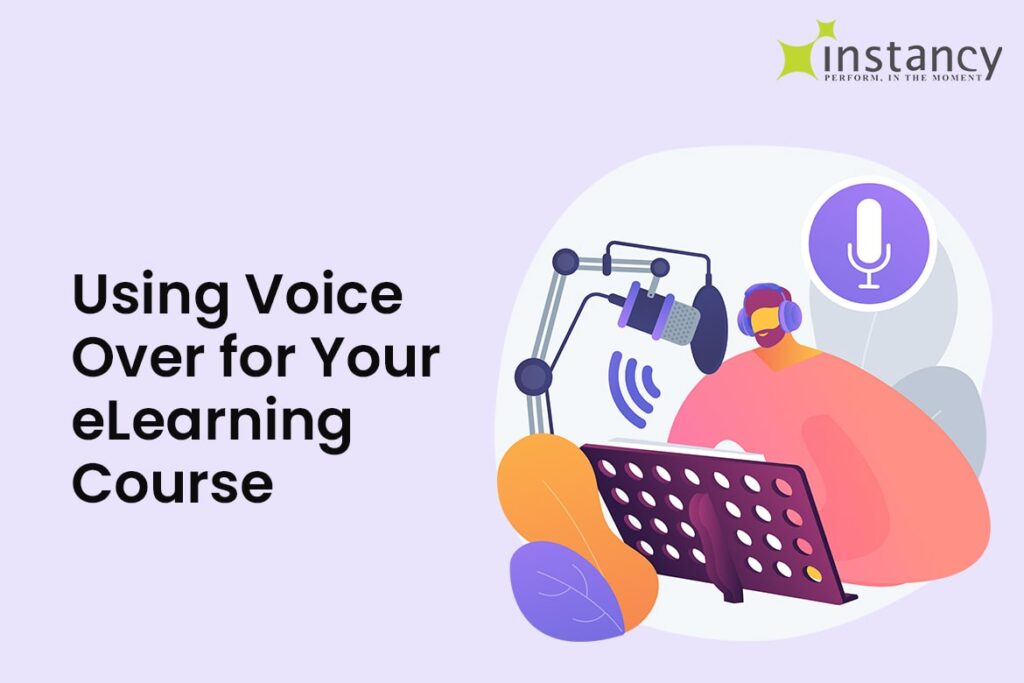Compelling audio narration enhances the instructional value of an online course. Audio content boosts user engagement and knowledge retention. While creating eLearning voiceovers does not seem like a stressful challenge, it is essential to understand that the benefits of narration for your eLearning course can only be achieved if your voiceover is carefully created and adds value to your eLearning experience. In this article, we take a close look at some invaluable tips for effective eLearning voiceovers.
- Outline your eLearning voiceover. Pay particular attention to learning goals and objectives, ensuring you keep your eye on the flow of the script. Keep the general tone of the script consistent, so the narration flows seamlessly. Analyzing your target audience will aid in keeping the tone relatable and help establish an emotional connection.
- Highlight your key ideas and emphasize the benefits. The key to transforming your eLearning course from just a collection of different modules to becoming a memorable learning experience lies in tying up the information in a meaningful and powerful way. This keeps the information relevant in a real-world setting and helps in establishing a connection with your learner. An attempt at understanding why your learner cares about the information offered will impact the tonality of the voiceover narration while highlighting the key ideas in the content.
- Maintain relevant transitions. A seamless transition between modules, lessons, and ideas will facilitate perfecting your eLearning course’s flow. If the course steers towards a completely different concept, figure out a subtle yet creative way to navigate the transition.
- Guide the student through the learning process. The narration voice and flow impact the learners. Make the voice both instructional and inspiring. This helps keep the learner motivated and encouraged. When narrated, emotionally charged stories and real-life experiences allow your learner to explore the relevance of your content to real-world scenarios.
- Keep the narration voice distinctive and original. While all of us take pointers from the more experienced, it is essential to be mindful of keeping your narrative voice unique and distinctively yours and yours alone.
- Create a natural and conversational script. Keeping the script natural and conversational makes your eLearning deliverables personalized and engaging. Deciding on the first-, second, or third-person narrative before preparing the script will help you stay consistent. The sentences should be concise while being both informative and authentic. Using one voice throughout will maintain a sense of relatability, especially if the content is not scenario-driven.
- Watch the clock. Keeping the eLearning voiceover script concise keeps the lessons brief and engaging rather than long and boring.
- Always do a test run. Despite the effort that goes into the fine-tuning of your script, it is important to do a test run to ensure a smooth and effective flow of your eLearning voiceover. This gives you a chance to make the necessary edits to any content that may be off-topic, irrelevant, or not in tandem with the tone of your eLearning content.
- Provide audio breaks. An audio break helps the learner process and absorb the information without rushing to the next topic. The intermittent silence will help your learner transition from one topic to another and emphasize examining charts, graphs, data, or taking assessments that need the requisite attention.
- Don’t let the audio steal the show. There are no prizes for guessing that the eLearning voiceover should work as an effective learning aid and not become the center of your learner’s attention. The voiceover should draw the learner’s attention to specific key points on the screen while engaging and involving the learner.
- Block the ambient noise. Any extraneous noise in the background will take away the attention and focus from the main subject. Even when the recording is in a seemingly quiet space, edit out the white noise that can distract the learner. Multiple free audio editing tools are available to fine-tune the voiceover for your eLearning deliverables.
Audio lends life to your eLearning course and helps the learner complete the course. A professional narration explains the concepts and makes the course engaging. Carefully consider using both the audio and text. Keep the text on the screen to a minimum and consider offering the audio script as a text feature. Learners have different preferences. Some learners prefer to read while other learners prefer audio. By finding the proper narration for your eLearning course, you gain the ability to create a polished, organized, and complete eLearning experience.
This blog is originally published at LinkedIn on 9th Jun 2021




